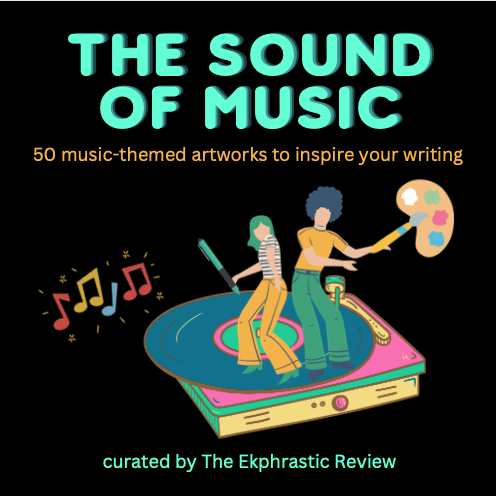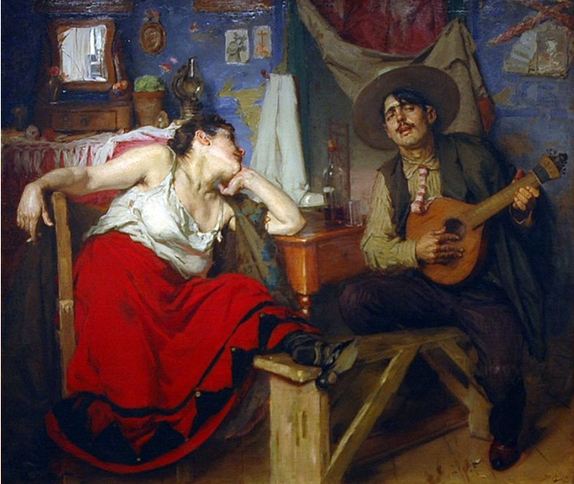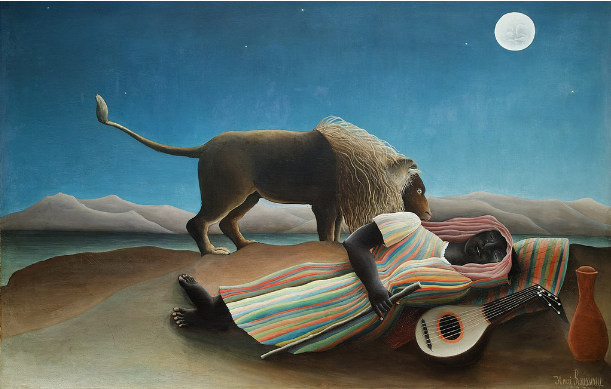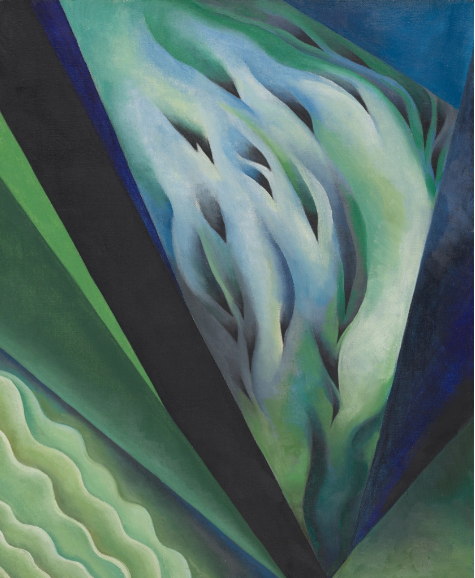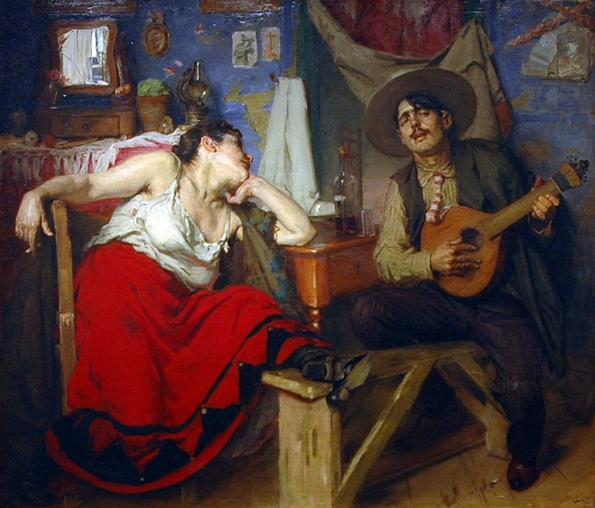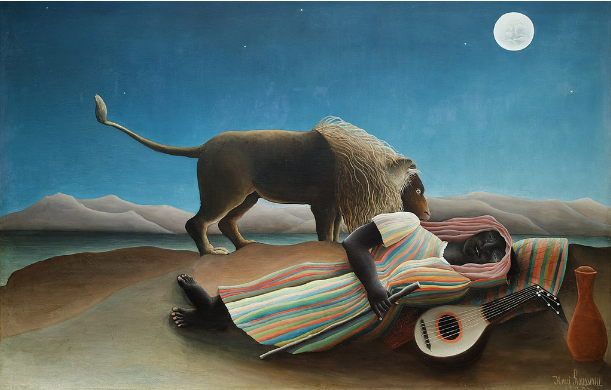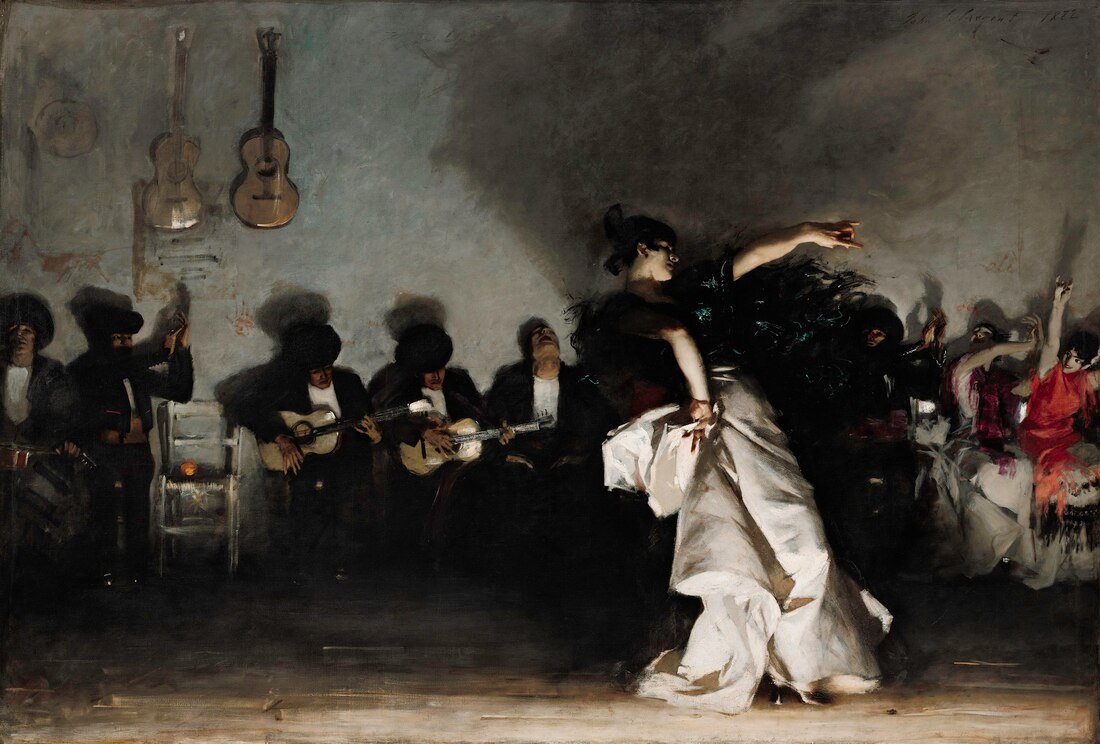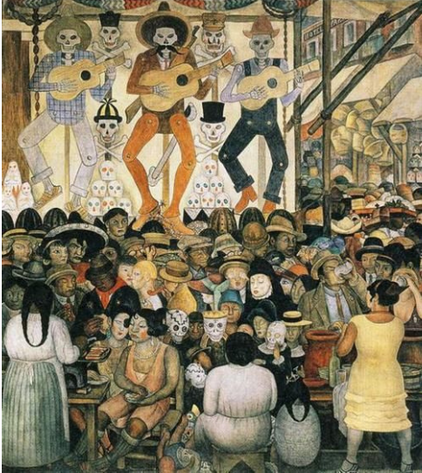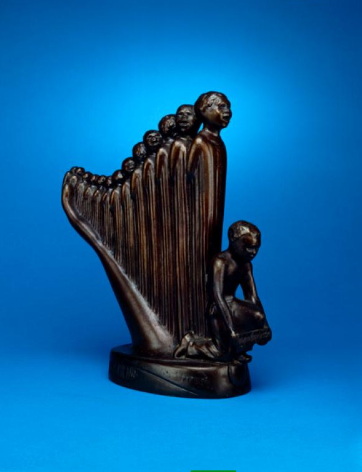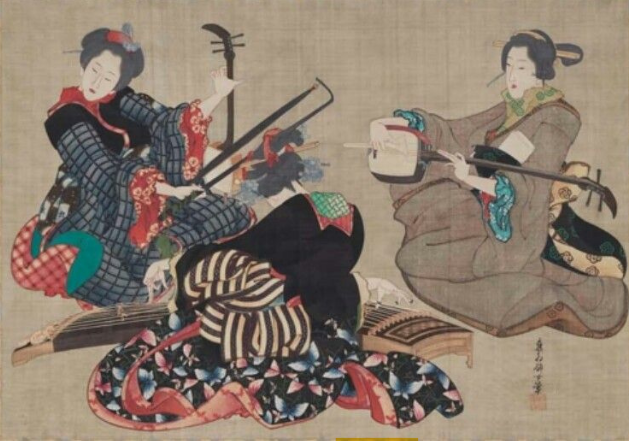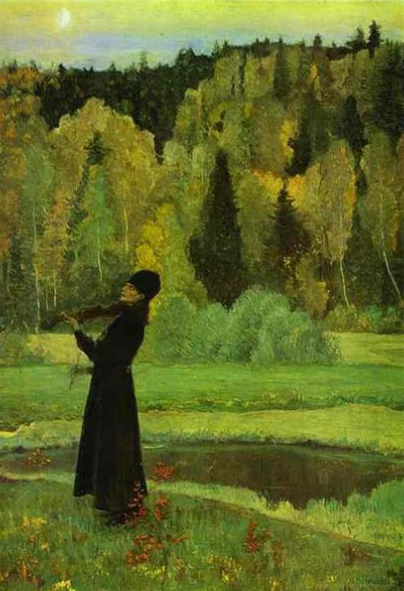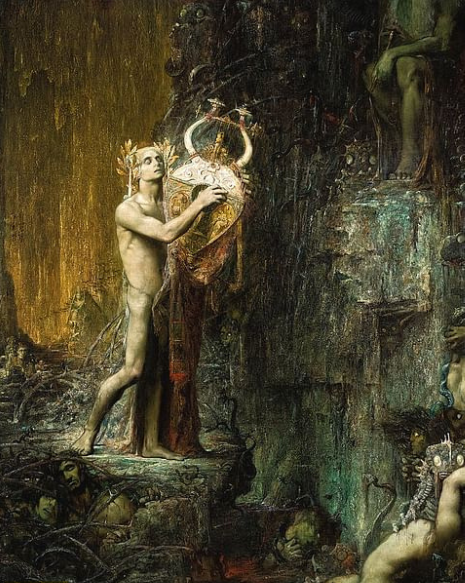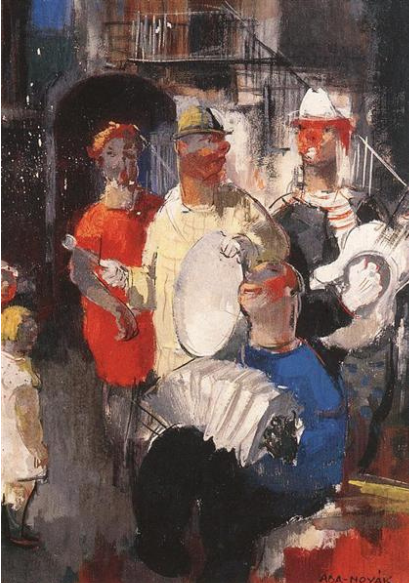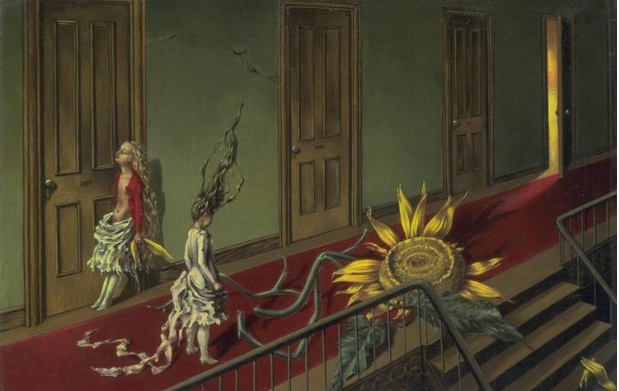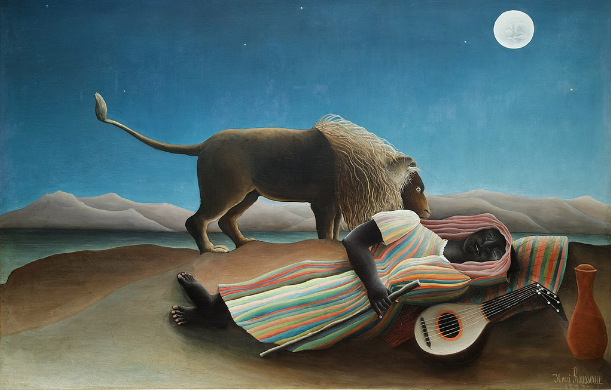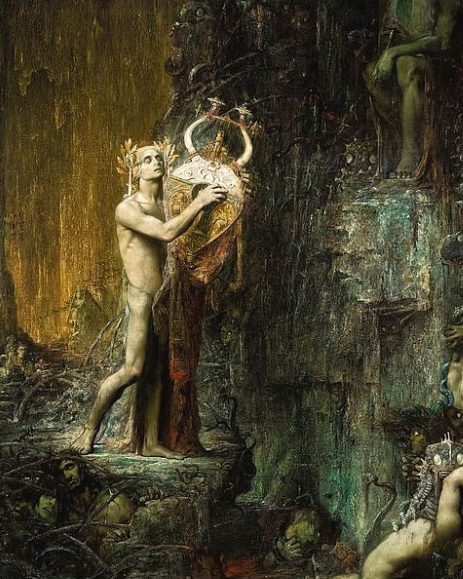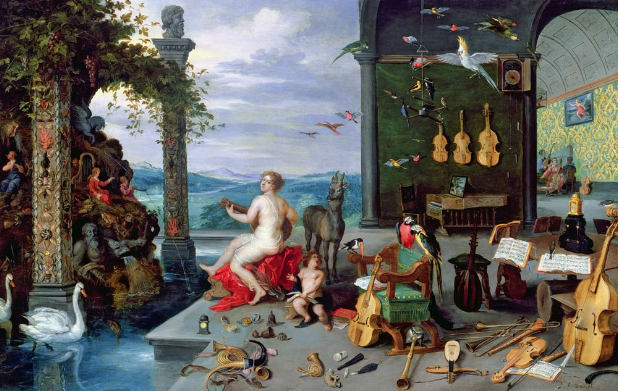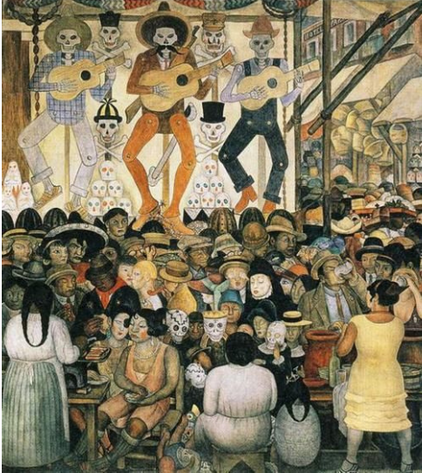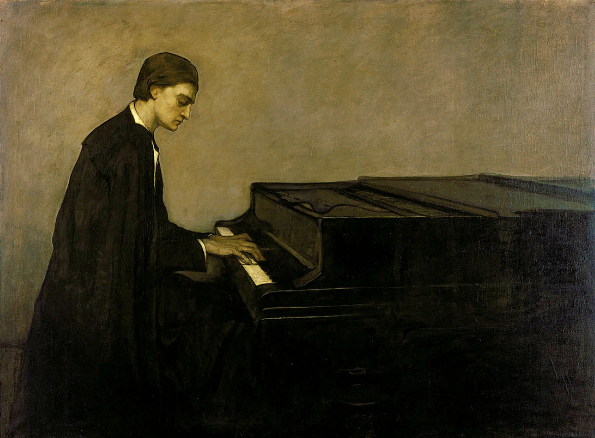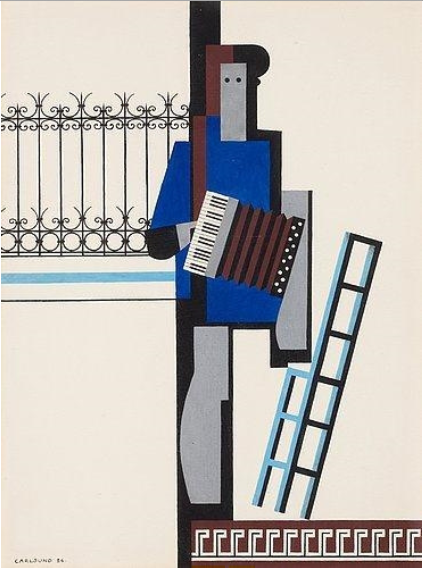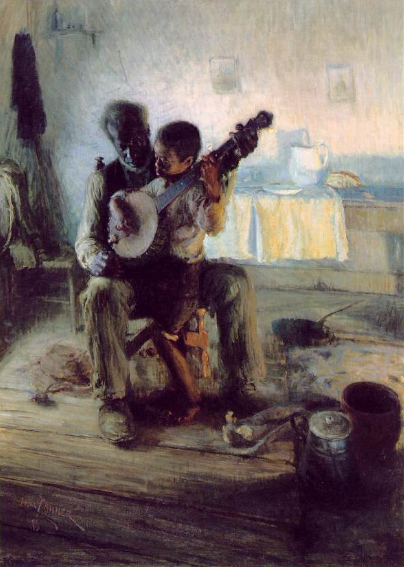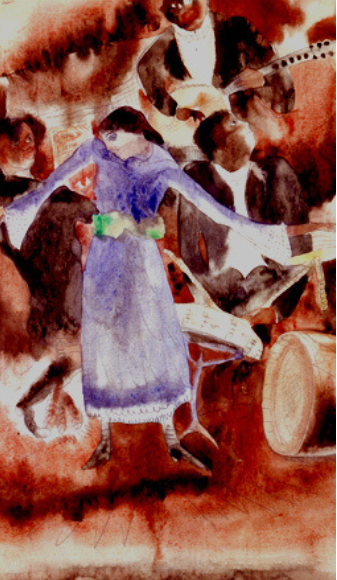|
Judging this unique competition was unalloyed pleasure. It was like standing at the intersection of three different art-forms and watching a fantastic carnival parade by - and sometimes being swept along with it. Perhaps because of the inherent challenge of juggling poetry, music and fine art all at once (in a kind of double- or triple-ekphrasis), all the submitted works were imaginative, sophisticated and strange. Unlike many competitions, there were simply no "bad" entries (whatever that means): I enjoyed every piece, all the weird and wonderful, poignant and funny, tragic and comic, grotesque and beautiful approaches on offer. It was incredibly hard to choose a "winner" from this poetic carnivalesque, and I want to thank everyone who entered for a wonderful entertainment. Jonathan Taylor http://jonathanptaylor.co.uk ** Dear Readers and Writers, A giant thank-you to Dr. Jonathan Taylor for his time and expertise judging this contest. Jonathan is a tough act to follow- his music-themed short stories and poetry are highly acclaimed. But we received so many amazing entries! Thank you to each and every one of you who took inspiration from the music themed artworks we showed you, and created something beautiful and important. Your poetry and stories were truly marvellous. The winner and the selected works to be published were chosen from a document with no author names or bios. It was surprising that from such a vibrant collection of diverse works we had several lucky authors with double or even triple placements in the finals. A big congrats to our winner, our finalists, and every single person who participated. Please spread the word about ekphrasis and The Ekphrastic Review, and help get more reader eyes on our writers, past, present and future. If you can share this or any post on your social media pages, we would be very grateful! Lorette Without further ado, our winner and finalists: First Place Fate, by R. Hamilton Finalists, in Alphabetical Order by Author Exceptional Lion, by Lizzie Ballagher Reef, by Lizzie Ballagher Leviathon Love Song, by Jude Luttrell Bradley Silent Night, by Dorothy Burrows Almeria, by Kate Copeland Calling on All Dead, by Kate Copeland The Harp, 1993, by Kate Copeland Three Women Playing Music, by Katsushika Oi, by Jane Forward Threnody for My Dead Violin Teacher, by Kimberly Hall Gospel Song, by R. Hamilton Some Klicks East of Budapesht, a Café, by R. Hamilton A Little Night Music, by Sue Mackrell The Gypsy Sleeps, by Mary McCarthy Greek Mythology Meets Modern Pathology, by Linda McQuarrie-Bowerman Taking Off, by Bayveen O'Connell Flashback, by Shaun R. Pankoski Sarabande, by F.F. Teague Communities of Loss, by Julene Waffle The Banjo Lesson, by Kate Young Jazz Singer, by Kate Young Contest Winner!!! Fate, by R. Hamilton Fate That August afternoon, Zacarias plays for his maestra guitarra — Madam Izar —a new song he has written that he feels may be a little sad but hopes is not so sad that the village girls who gather to gossip after church (especially the pretty Élina) will no longer flirt with him, leaving him no one to escort home or to make jokes with before going alone to his own house where he lives in reluctant solitude. When he gets to the chorus, though, he notices a senhora dozing, loose in her chair like she is young again, dreaming (he imagines) of her childhood in the Pyrenees before she was forced to flee across the Cantabrian mountains by herself after her family fell victim to Franco’s retaliation against Basque nacionalistas. When he notices her leg twitch, it leads him to believe his theory correct, so he plays on for her, just her, softly, hoping it is his lullaby helping her sleep rather than just the wine and hot weather. R. Hamilton R Hamilton (they/them) is returning to poetry as a means of filling the vacuum left after a fifty-year career backstage in the performing arts, a retirement handily but unexpectedly coincident with the pandemic. Since then, Hamilton’s work has been/will be presented by Boats Against the Current, Caesura, Dollar Store, Ekphrastic Review, Intangible, and Nightingale & Sparrow, among others. Congratulations to all of the writers below, our finalists, whose work was selected for publication. (In alphabetical order, by author.) Exceptional Lion Do you dream, pilgrim, of the lovers left behind-- those you beguiled with your mandolin? Is it wise to travel the thirsty desert with a single water-pot—and quite alone? Or have you drunk deep of mandragora and drift now to another shore where climes are kind, where you need no wooden stave to fend off beasts of prey? My gypsy friend, I think you do not know: this lion’s immortal, exceptional. He’s the one Androcles rescued centuries ago—from whose paw drew out a savage blackthorn. Soft-muzzled, inquisitive, he’s the one who then refused to fall on Christians thrown to him in Circus Maximus, but hunkered down on haunches, licked his tender, wounded paw, grinned gleefully / playfully at the Christians—despite avid Romans’ blood-lust roar. Camping under a ripened moon, and under stars, you’ve no idea how blessed you are, traveller, that it’s Androcles’ holy lion who found you, who watches over you until blue dawn. Strange how your broken dreams, your lonely music, have drawn again the cruel thorn from this old lion. Lizzie Ballagher In 2022, Ballagher was chosen as winner in Poetry on the Lake's formal category with a pantoum entitled ‘Across the Barle’. Her work has appeared in print and online on both sides of the Atlantic; it has also been presented in podcasts on Poetry Worth Hearing (Anchor fm). Several of her poems in the last two decades have, too, been set to music. Contributing regularly to Southeast Walker Magazine, she lives in the UK, writing a blog at https://lizzieballagherpoetry.wordpress.com/. Reef narrowing chasm-- kelp caught in cornflower currents sea-glass harmonics Lizzie Ballagher In 2022, Ballagher was chosen as winner in Poetry on the Lake's formal category with a pantoum entitled ‘Across the Barle’. Her work has appeared in print and online on both sides of the Atlantic; it has also been presented in podcasts on Poetry Worth Hearing (Anchor fm). Several of her poems in the last two decades have, too, been set to music. Contributing regularly to Southeast Walker Magazine, she lives in the UK, writing a blog at https://lizzieballagherpoetry.wordpress.com/. Leviathan Love Song My favourite love song is the one you wrote about my sea blue eyes, in the antediluvian days before Eden. world of two topographies: One you. One me. Awakening in those briny ancient depths after epochs of deep-sea silence, you yawned, opening wide your titanic mouth, in a groggy, foggy gesture I took the wrong way. From the distance of my solitary widow’s walk, I mistook your gaping watery maw for an invitation to take refuge in that fleshy grotto, to lose myself in the depths of you. Creature without fear, I dove headfirst from my yearning perch, swiftly sinking beneath your glistening white wake. You rewarded my bravery with a serpent song. Building slowly like a ballad it gradually uncoiled to reveal a thrashing hard rock hook: YOUR EYES! YOUR EYES! YOUR EYES! The deafening song stripped me bare of fear and loathing, clothes and hair--- then spewed me from your bored belly to gritty shore. Naked. Broken. Bewildered. Reborn. Jude Luttrell Bradley Jude is a Pushcart-nominated writer whose work has appeared on National Public Radio and in assorted literary journals and magazines including The Ekphrastic Review, Tupelo Press, Thimble, Moon Love, and Oberon. Her poem“Had” was selected for Atlanta Review 2022 International Poetry Competition Merit award. “Beasts of No Nation” earned Honorable Mention in the Oberon poetry magazine 2022 competition. Jude’s work re-envisions history, classical literature, and reflects on life in an ever-shrinking, ever-expanding pandemic world. Jude is the Reverend Al Green’s biggest fan. Silent Night A thunder moon; the hot lash of her tongue stalks his loneliness through this cold night in this treeless land of sand and salt pans. Here, he must ache, haunted by surly beasts who prowl through his wine-drenched hours under stars that flicker fake light on his past. He stirs, shivers, stills. He mutters, sensing harsh grit clawing at his feet. His heels shift sinking every grain of hope. While he dreams, his half-gripped staff strikes out at empty air. See how he mocks his lute with ghost-plucks as some random lion mauls his tangled heart. Dorothy Burrows Based in the United Kingdom, Dorothy Burrows enjoys writing poems, flash fiction and short plays. Her writing has been published in various journals and webzines including The Ekphrastic Review, The Alchemy Spoon, Spelt, Dust Poetry Magazine and Wales Haiku Journal. In her youth, she attempted to play the piano. Almería In the house of the guitar players, I learned to sing again. To dance to waves, indalos…my orange space I changed for white silks, it's an All Andalus State of Mind, this Jaleo place of mind, where bliss alternates between wooden boards and shameless arms. Is that good… should I halloo? In the shade of the guitar players, I learned to free again. To curve my body to light, close doors to dark hallways…enter living rooms where beats flirt me, commotional force, my dolphin legs, where signboards alternate between war and mosaics, among tongues and tunes. In the caves of Almería, I learned to write again. To read the troubadours, the unspoilt dunes…a red-sand space I’ll never change, winter blue-green crashing, where I went to see the castle, songs started, and I took pictures of time. Who will remember this…remember me? In the shade of Almería, I learned to fall again. To dance to gitanos, royal poets…I shared my ice-cream and drank vermouth, danced and danced the Sunday long, longing, for my arms around your waist, bronzed. Time shouts ever down the caves. Jaleo stays a never broken chain. Kate Copeland Kate Copeland started absorbing stories ever since a little lass. Her love for words led her to teaching & translating; her love for art & water to poetry…please find her pieces @ The Ekphrastic Review (incl. Podcast & translations), First Lit. Review-East, Wildfire Words, GrandLittleThings, The Metaworker, The Weekly/Five South, New Feathers a.o. Her recent Insta reads: https://www.instagram.com/kate.copeland.poems/ Over the years, she assisted in literary festivals and Breathe-Read-Write workshops. More workshops to follow! Kate was born @ a harbour city and adores housesitting @ the world. Calling on all dead Mira los muertos Get out Salga Best dress and Ropa linda y Sugar skull, orange Calavera de azúcar, naranja Chrysanthemums Los Crisantemos Get out Salga Frida’s blues and De la Frida’s azul y Wear your cloak, a golden Lleva tu rebozo, una Guitar Guitarra dorada Get there Llega And braid your braids Y trenza tus trenzas Fill the market, salute Llena la plaza, saluda With cocoa Con chilate Salud, dinero y amor Salud, dinero y amor Get up Levantate And serenade your nan Y canta a tu nona Our dog Xólotl, recall Nuestro Xólotl, recuerda Their dreams Sus sueños Get up Levantate To dance A bailar The Jarabe, high La Jarabe, altos Hats to honour Sombreros para honrar The two truly dead days Los dos veraz días muertos Get through Pasa The past Más allá Doorway, like Por la puerta, igual The last November Por algún noviembre Kate Copeland Kate Copeland started absorbing stories ever since a little lass. Her love for words led her to teaching & translating; her love for art & water to poetry…please find her pieces @ The Ekphrastic Review (incl. Podcast & translations), First Lit. Review-East, Wildfire Words, GrandLittleThings, The Metaworker, The Weekly/Five South, New Feathers a.o. Her recent Insta reads: https://www.instagram.com/kate.copeland.poems/ Over the years, she assisted in literary festivals and Breathe-Read-Write workshops. More workshops to follow! Kate was born @ a harbour city and adores housesitting @ the world. The Harp, 1993 Lift every voice and sing Till earth and heaven ring - James Weldon Johnson Clannad’s Celtics made me giggle, but you held me hand and introduced me, to concert halls, all royal and all, a piano and a harp, while I laughed at first, looked for my lipgloss, loved you at the end, at coda, and you held me to tell too, about the gigs I felt, devoured, in a lifetime, about Shaw’s Cali Soul, that holds my melancholy forever, for ages, the stages, they held canyons, where neighbours shared the cats and cabins, the guitars, high as listening skies, and maybe I should witter less, yet you kept such gruffed mountain views, the slowhands got me on my knees, made me fall, with you, him, players, with tastes and thirst, and so will I forever sing, string, along a breakfast song, past an emptiness on my bed, undress me, whisper or cry, till heart meets atlas, as I waited till we drove ‘round an island and dove into blue, you do something to me, and so, whether West streets or port towns, my distance started while you held my hand, with rooms on fire, but I never laughed like before, when Clannad staged the harp. Kate Copeland Kate Copeland started absorbing stories ever since a little lass. Her love for words led her to teaching & translating; her love for art & water to poetry…please find her pieces @ The Ekphrastic Review (incl. Podcast & translations), First Lit. Review-East, Wildfire Words, GrandLittleThings, The Metaworker, The Weekly/Five South, New Feathers a.o. Her recent Insta reads: https://www.instagram.com/kate.copeland.poems/ Over the years, she assisted in literary festivals and Breathe-Read-Write workshops. More workshops to follow! Kate was born @ a harbour city and adores housesitting @ the world. Three Women Playing Music, by Katsushika Oi Silk kimono and uchikake rustle and billow as the women settle onto the floor. It is winter, the padded layers make cozy nests for the musicians. Perfectly coiffed hair, painstakingly combed and waxed into shape, adorned with bamboo ornaments and silk flowers, do not cover shell pink ears. Heads tilt and bend, so as best to hear the gentle strains of koto zither, sanshin lute, and upright kokyu whose bow draws slowly downward, coaxing out a bird-like voice. The delicate strains of the instruments can be heard only by them, the artistry of their music drowned to onlookers by the crescendo-decrescendo of father’s great wave off Kanagawa. Jane Forward Jane Forward loves diving down the rabbit holes of research she enjoys when preparing to write an ekphrastic piece. Jane was delighted to learn the tantalizing tidbit that Katsushika Oi’s father painted Thirty-six Views of Mt Fuji, including The Great Wave off Kanagawa, a painting tucked away in her folder for yet-to-be-written ekphrastic flash fiction. Her attempts at this art form can be found on her website: jkforward.com Threnody for My Dead Violin Teacher Recommended listening: Adagio for Strings (1936) by Samuel Barber; Élégie for Solo Violin/Viola (1944) by Igor Stravinsky; Threnody to Toki, for String Orchestra and Piano (1980) by Takashi Yoshimatsu You died just after the turn of the year. That’s not the hard part of this. The hard part is finding the right colours. The right tones, textures. There is so much to express, and I don’t want my memories to all blend into this sickly haze of green – slippery, like my contact point when I don’t use enough rosin, like the smell of grass beneath my feet as I wonder how much time is left before the evening storm. I roll my shoulders and my wrists, and I remember how you would scold me for my rounded posture. My pigeon toes. I remember how you would sigh that particular sigh, and my heart would drop into my stomach. I soften my tone. Widen my vibrato. I pay attention to the weight in my fingers, let the music swell and release, like a good cry. Like the sky after rain. I remember the hymns you would hum beneath your breath, and time the shift of my left hand just so my fingers glide along the overtones and the natural harmonic sings. I remember to breathe, so that the phrase lasts as long as I can bear it. As the final note rings in the quiet, I wait for the echo, but – but you died just after the turn of the year. There will be no answer. Only the green root, diminished. Only memory. Tension without resolution. An unstable cadence in unsteady hands. Kimberly Hall Kimberly Hall (she/her) is a queer and neurodivergent poet and writer. She received her master's degree in behavioral science from the University of Houston-Clear Lake. Her poetry and prose can be found in online publications such as First Flight, Sappho's Torque, and Equinox, as well as in several ekphrastic poetry anthologies and an upcoming anthology from Mutabilis Press. She still gets the idiomatic butterflies whenever anyone mentions these things where she can hear them. Gospel Song In a preferred and alternate universe, Moshe returned from the Sinai heights holding aloft clunky stone tablets clarifying the Cycle of Fifths, the differences between Aeolian/Mixolydian/etc. modes, and how best to avoid an arbitrary use of the C clef. Also included were a few forebodingly proscriptive admonitions concerning, for example, parallel octaves, stupefying consonance, and polka arrangements of Pink Floyd. Sadly, in this — our — world, such wisdom was lost to us forever by the regrettable accident of its being unnoticed under some old rags in the raided ark of Indiana Jones because its curators were distracted by Offenbach on the radio. R. Hamilton R Hamilton (they/them) is returning to poetry as a means of filling the vacuum left after a fifty-year career backstage in the performing arts, a retirement handily but unexpectedly coincident with the pandemic. Since then, Hamilton’s work has been/will be presented by Boats Against the Current, Caesura, Dollar Store, The Ekphrastic Review, Intangible, and Nightingale & Sparrow, among others. Some Klicks East of Budapesht, a Cafe Some klicks east of Budapesht, a cafe carved from old rubble can sometimes be noticed by passersby in the dusk when the light is brittle enough and sharp, its location a mutable thing depending primarily on the traveler’s grasp of sobriety, their willingness to toss a forint or two into the cup for the musicians, and how broken are their hearts. Joska performs Brahms’ Hungarian Dance #5 on his melancholy guitar slowly in a pale key so well that the ghosts of war and plague alike are prompted to push aside their chairs for the czárdás, their feet gliding slightly above the floor and flawless, all but ignored by Réka and Csilla who use bits of sausages on forks as puppets to argue about the decline of the carnivalesque in cabaret over their goulash and beer. Meanwhile, on his drum, Oszkár plays histories that we deny over and over again, thrumming the way this great Plain of Pannonia has been overrun repeatedly, unrelievedly by Mongol horde, Ottoman empire, Axis sympathizer, and Fascism, Fascism, and still more Fascism; Whereas the songs of loss that as birdlings fly away into the evening from Zindel’s concertina will stay with his audience forever, like first love: haunting us over and over again all over and over again. Luca’s red dress warms the scene like a small, local, vital sun orbited by three moons in perfect gravitational symmetry, balancing each other seamlessly as she sings so softly, so gently lyrics using unknown words. They all side-eye the sounds of rockets combatting in the Ukraine sky over the near mountains, and play louder in the hope that by doing so they can send the missiles back from whence they launched; a noble goal to which they seem most dedicated. Moved, I reach into my bag for my wallet to offer them a monetary token of my appreciation, but when I look up, they are as gone as yesterday; leaving behind only a faint trace of melody swiftly fading into fable while the horizon flares with the false dawn of disharmony burning bright. So I make myself comfortable to await the next show. R. Hamilton R Hamilton (they/them) is returning to poetry as a means of filling the vacuum left after a fifty-year career backstage in the performing arts, a retirement handily but unexpectedly coincident with the pandemic. Since then, Hamilton’s work has been/will be presented by Boats Against the Current, Caesura, Dollar Store, Ekphrastic Review, Intangible, and Nightingale & Sparrow, among others. A Little Night Music Once upon a time she was told don’t. But she did, this girl and her doppelganger doll with spectral hair, curious and curiouser about forbidden rooms in a corridor carpeted in blood-red, where a sunflower lays its heavy head, tendrils writhing. She swoons. Petals hang from her hand as she is caught in a Shining vortex of energy that rips her lace to ribbons. Behind her a door opens a piano plays Eine Kleine Nachtmusik. Adagio Sue Mackrell Sue Mackrell lives in Leicestershire, UK. She has an MA in Creative Writing from Loughborough University. Retirement from teaching and facilitating Creative Writing workshops gives her more time to write. Her poems have been published several times in The Ekphrastic Review and Agenda, also recently in Bloody Amazing (Dragon Yaffle) Diversifly (Fair Acre Press) Whirlagust III (Yaffle) and online in Words for the Wild. The Gypsy Sleeps In a desert landscape under an almost starless sky between the lion and the mandolin Her black skin scarless without the lines of grief and worry her hair dressed with red ochre and combed straight without knot or tangle simple as the lines of her long striped gown She smiles in her sleep while the lion wakes his wild heat banked against her stillness his hunger quieted even while her mandolin rests silent at her side the memory of its magical vibration holds them close breath to breath she smiles and he leans in to listen to the music of her dreams Mary McCarthy Mary McCarthy is a retired Registered Nurse who has always been a writer. Her work appears in many anthologies and journals, including The Ekphrastic World, edited by Lorette C. Luzajic, The Plague Papers, edited by Robbi Nester, and recent issues of Verse Virtual. 3rd Wednesday, Blue Heron Review. Earth’s Daughters, Gyroscope, and Caustic Frolic. She has been a Pushcart and Best of the Net nominee. Greek Mythology Meets Modern Pathology Orpheus, you didn’t keep your word and like Lot's wife, you messed with gods and paid the price, Eurydice lost to you forever. Perfect beauty and divine music did not save you from the consequences of your actions. And what of us who are like white bread to your brioche? We stand no chance against our own weaknesses. Every day we hear the stories of miscalculation, the down-right stupid and the dead and dying, smaller articles on the bottom right-hand corner of page 24 reserved for those of us anonymously unimportant and the larger, in-your-face lamentations for the rich, the famous and the infamous and the families of the rich, the famous and the infamous who do not contribute more to this mortal world. Our human priorities are skewed. We’ve forgotten who makes the world go round. The checkout chick/guy and the night packer and the garbage collector and the cleaner and the waiter and the shop assistant and the miner down a dark, black hole and the maid who ‘yes sir/yes ma'am's’ all day long and the plumber scraping out slime from pipes and the young au pair who has to listen to the rich kid’s constant squealing, all for a room (cupboard), next-to-no pay and the husband’s hand crawling up her dress and the receptionist condemned to smile at everyone until her mouth’s in rictus and the gardener on arthritic knees pulling out weeds and the baker crawling out of bed at 1 am and the teacher now expected to be educator/mum/dad/counsellor/juvenile offender warden, and when I think way back to when I was a kid, the dunnyman, carrying the overflowing outdoor toilet cans heaved up on his shoulder vomiting all the way back to his truck. Orpheus, I think you got off lightly. Linda McQuarrie-Bowerman Linda lives in Lake Tabourie, NSW, by the sea. In this beautiful environment, she writes poetry and has recently dabbled in flash fiction. Linda is completing her Degree in Creative Writing at Curtin University and enjoys seeing her work published in various literary spaces. She is a recent Pushcart Nominee thanks to the Ekphrastic Review. Taking Off We are not swans. We do not mate for life or share the same plumage. We do not inhabit sleepy canal banks or glide on still lakes flanked by mountains that mimic the curves of our backs as we dip down to feed. Our necks do not intertwine to make Valentine hearts. We do not make eggs; we break them. We hiss. We flap and drive each other further away in the wake. We pluck at the feathers of our good times and let the wind take them. We spread our spans wide for one last embrace and all we feel are the brittle bones of who we were when we tried to fly. Bayveen O'Connell Bayveen O'Connell is an Irish writer whose flash fiction has been nominated for the Pushcart Prize and for Best Microfiction. Her words have appeared or are forthcoming in Brilliant Flash Fiction, Janus Literary, Splonk, MacQueens Quinterly, The Ekphrastic Review, The Forge, Fractured Lit, and others. She's inspired by travel, folklore, history, myth, music, and art. Flashback Nineteen seventy nine. Disco was almost dead. But not at The Stage Door. Not yet. Donna would moan on a Saturday night while the smoke machine churned and the mirrored ball turned reflecting our faces, sweating and glittery, bright eyes wide and shining from cocaine and poppers and pure adrenaline. When The Village People sang YMCA, we sang right along with them, dancing the alphabet. Sylvester made us feel mighty real. We were bad girls and macho men, beep beeping, toot tooting our way to the eighties, when everyone started to die. Shaun R. Pankoski Shaun R. Pankoski lives in Volcano on the Island of Hawai'i with her cat, Kiko and more coqui frogs than she cares to mention. Her two most treasured possessions are handwritten thank you notes from Lois-Ann Yamanaka and the late Barry Lopez. She has kicked cancer's ass (twice) and makes a mean corn chowder. Sarabande She is playing Debussy as marked in his note, with a solemn and slow élégance; it resounds in her clothing, her fashionable coat, through this sombre and chic courtship dance. It should be like a portrait, Debussy had said – an old portrait, a Louvre display; she is subtle in colours, her lips barely red and her skin tone a soft gold-and-grey. And her lover keeps painting, perhaps with a smile, maybe more, as the sarabande swells, and the chords are progressing; she sits with such style, as she saunters through all parallels. F.F. Teague F.F. Teague (Fliss) is a copyeditor/copywriter by day and a poet/composer come nightfall. She lives in Pittville, a suburb of Cheltenham (UK). Her poetry features regularly in the Spotlight of The HyperTexts; she has also been published by The Mighty, Snakeskin, The Ekphrastic Review, The Dirigible Balloon, Pulsebeat, Lighten Up Online, and a local Morris dancing group. Other interests include art, film, and photography. Communities of Loss His Hohner hunches in his hands like an old cat curled in his lap. When the bus breaks loose on the corner and commuters pour out like ants freed from a child’s glass farm, he rises as if ceremony stands at his heels. He lifts his leg to lean on the chair he uses between buses on hot days, long days, and begins to pull and press and pump his way through a few happy polkas. Strangers pass without change in his case or nods in his direction, but when he plays a tune his father taught him about the old country, that hums a longing note under peaky memories of his mother after typhoid and his sister whose love died in the trenches, It is then that people stop, then that they listen, and then that the change clinks in the old man's accordion case echoing all their communities of loss. Julene Waffle Julene Waffle graduated from Hartwick College and Binghamton University. She is a rural public high school English teacher, an entrepreneur, a nature lover, wife, and mother of three boys, two dogs, three cats, and a bearded dragon. Her work has appeared in The Adroit Journal, NCTE’s English Journal, La Presa, The Non-Conformist, and Mslexia, among others. She was also published in the anthologies Civilization in Crisis, American Writers Review 2021, and Seeing Things (2020), and her chapbook So I Will Remember (2020). Learn more at www.wafflepoetry.com, Twitter: @JuleneWaffle, and Instagram: julenewaffle. The Banjo Lesson A small boy nestled in shadows straddles the old man’s lap. Warmth spreads, his face flush with trust and anticipation. His fingers stretch across frets feeling the press of steel on skin the soft pad of young flesh marked with pain and indentation. He plucks at strings, hears the thrum vibrating through his grandpa’s arm. They listen to the new tune its hum on the cusp of the future. Kate Young Kate Young lives in England and enjoys writing poetry, painting and playing the guitar and ukulele. Her poems have appeared in various webzines, magazines, and chapbooks. Her work has also featured in the anthologies Places of Poetry and Write Out Loud. Her pamphlet A Spark in the Darkness has been published by Hedgehog Press and her next pamphlet Beyond the School Gate has been accepted for publication in 2023. Find her on Twitter @Kateyoung12poet. Jazz Singer With shifts as long as the rolling conveyor she passes the time inventing riffs scats to the beep of electric machines taps to the rhythmic bar code scanner hums Coltrane’s Blue Train in Eb minor. Annie is decked in C major grey a checkout-girl with no middle eight to break the round-the-clock monotony of a humdrum whine looping the scale interspersed with the tap of acrylic nails. Dull, he scoffed, the bloke on deli a girl with no voice, his usual sneer as she slipped the tabard into her locker toe-tapping on sidewalks of New Orleans to the Blue Nile neon inviting her over. Ten minutes later she appears on stage the smell of jazz smoking the air in mellow tones of the saxophone the bluesy coo of a clarinet smooth buzz of brush on skin and snare. She fills her lungs with ‘Summertime’ full of swing, only Ella on her mind, spread your wings…you’ll take to the sky like a lilac butterfly, newly emerged its velvet foil on the edge of vibrato Kate Young Kate Young lives in England and enjoys writing poetry, painting and playing the guitar and ukulele. Her poems have appeared in various webzines, magazines, and chapbooks. Her work has also featured in the anthologies Places of Poetry and Write Out Loud. Her pamphlet A Spark in the Darkness has been published by Hedgehog Press and her next pamphlet Beyond the School Gate has been accepted for publication in 2023. Find her on Twitter @Kateyoung12poet.
0 Comments
Your comment will be posted after it is approved.
Leave a Reply. |
The Ekphrastic Review
COOKIES/PRIVACY
This site uses cookies to deliver your best navigation experience this time and next. Continuing here means you consent to cookies. Thank you. Join us on Facebook:
July 2024
|
